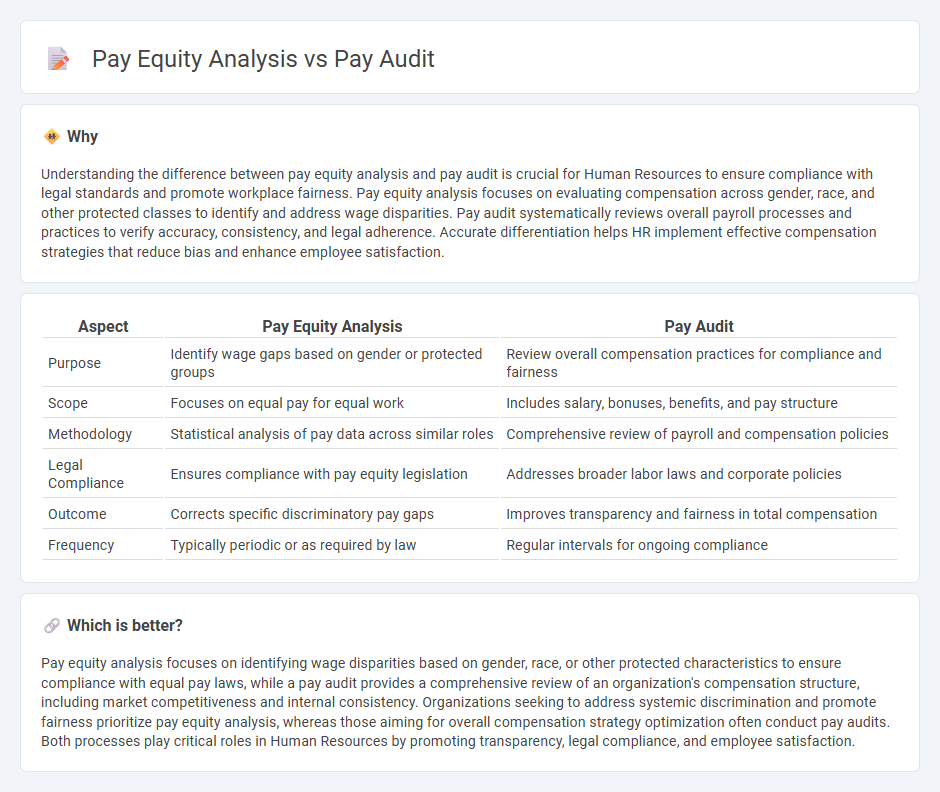
Pay equity analysis systematically compares compensation among employees to identify disparities based on gender, race, or other protected categories, ensuring compliance with equal pay laws and promoting workplace fairness. A pay audit involves a comprehensive review of payroll data, assessing overall compensation practices, identifying patterns of inequity, and evaluating adherence to organizational policies and legal standards. Explore effective strategies for implementing pay equity analysis and pay audits to foster transparency and equity within your organization.
Why it is important
Understanding the difference between pay equity analysis and pay audit is crucial for Human Resources to ensure compliance with legal standards and promote workplace fairness. Pay equity analysis focuses on evaluating compensation across gender, race, and other protected classes to identify and address wage disparities. Pay audit systematically reviews overall payroll processes and practices to verify accuracy, consistency, and legal adherence. Accurate differentiation helps HR implement effective compensation strategies that reduce bias and enhance employee satisfaction.
Comparison Table
| Aspect | Pay Equity Analysis | Pay Audit |
|---|---|---|
| Purpose | Identify wage gaps based on gender or protected groups | Review overall compensation practices for compliance and fairness |
| Scope | Focuses on equal pay for equal work | Includes salary, bonuses, benefits, and pay structure |
| Methodology | Statistical analysis of pay data across similar roles | Comprehensive review of payroll and compensation policies |
| Legal Compliance | Ensures compliance with pay equity legislation | Addresses broader labor laws and corporate policies |
| Outcome | Corrects specific discriminatory pay gaps | Improves transparency and fairness in total compensation |
| Frequency | Typically periodic or as required by law | Regular intervals for ongoing compliance |
Which is better?
Pay equity analysis focuses on identifying wage disparities based on gender, race, or other protected characteristics to ensure compliance with equal pay laws, while a pay audit provides a comprehensive review of an organization's compensation structure, including market competitiveness and internal consistency. Organizations seeking to address systemic discrimination and promote fairness prioritize pay equity analysis, whereas those aiming for overall compensation strategy optimization often conduct pay audits. Both processes play critical roles in Human Resources by promoting transparency, legal compliance, and employee satisfaction.
Connection
Pay equity analysis and pay audits are interconnected processes aimed at identifying and addressing wage disparities within an organization. Pay equity analysis examines compensation across demographic groups to ensure fairness, while pay audits systematically review payroll data to detect inconsistencies and compliance issues. Together, these practices support transparent salary structures and promote fair compensation strategies in Human Resources.
Key Terms
**Pay Audit:**
Pay audit systematically examines compensation data across an organization to identify discrepancies, ensuring adherence to legal standards and internal policies. It evaluates salary ranges, bonuses, and benefits to detect potential pay gaps related to gender, race, or job roles, promoting transparency and compliance. Discover how a comprehensive pay audit can enhance fairness and mitigate risk in your workforce.
Wage Discrepancies
A pay audit systematically reviews employee compensation to identify wage discrepancies and ensure compliance with internal policies and legal standards. Pay equity analysis specifically examines whether employees performing similar work receive equal pay, aiming to uncover and rectify systemic biases related to gender, race, or other protected characteristics. Explore the distinctions and methodologies in pay audit and pay equity analysis to better address and resolve wage gaps within your organization.
Salary Benchmarking
Salary benchmarking is a critical component distinguishing pay audit from pay equity analysis, with the former focusing on overall compensation alignment against market standards, while the latter emphasizes fairness within internal pay structures. Pay audits assess competitive salary positioning to attract and retain talent, using external market data to identify pay gaps relative to industry norms. Explore in-depth strategies to optimize salary benchmarking through comprehensive pay audits and equity analysis.
Source and External Links
How to Conduct a Pay Audit, and Why It Matters - This article explains the importance and process of conducting a pay audit to ensure fair compensation and identify pay disparities.
Pay Equity Audits Checklist - Provides a checklist for conducting pay equity audits to identify and correct pay discrepancies based on nondiscriminatory reasons.
How to Conduct a Pay Equity Audit | Steps & Best Practices - Outlines the steps and best practices for conducting a pay equity audit to identify and address pay disparities within an organization.
 dowidth.com
dowidth.com